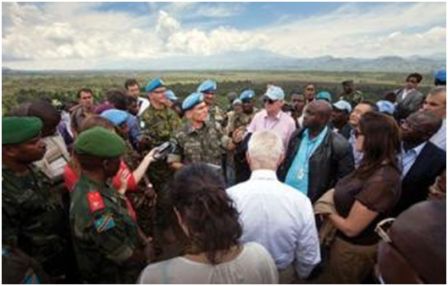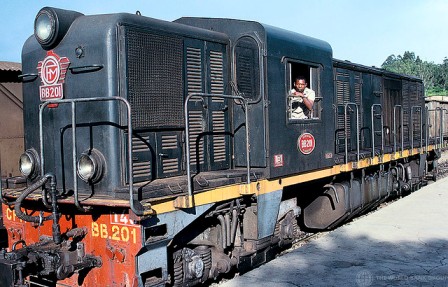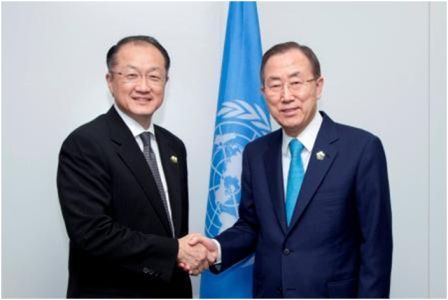On a visit to Africa’s Great Lakes, Council urges break with past
Five months after United Nations Secretary-General Ban Ki-moon and World Bank President Jim Yong Kim visited Africa’s Great Lakes region, a 15-member delegation of the UN Security Council followed suit. The delegation travelled to the region from 4 to 8 October and met with political leaders and local activists, displaced persons and refugees, as well as UN peacekeepers and diplomats. Photo: UN Photo/Sylvain Liechti, Security Council delegation being briefed during its visit Goma, DRC.
The visit was an attempt by the Council to get a better grasp of the complexities of a region where instability has persisted over the past two decades, with a new peak in fighting seen in recent months. Since April 2012 and the creation of the March 23 armed movement (known as the M23), renewed fighting has forced up to 2 million people to flee their homes, mainly in the eastern region of the Democratic Republic of the Congo (DRC).
The visit came three years after another Council trip to the same region that had modest ambitions: just a two-country visit to the DRC and Uganda. This time, however, after stops in these two countries, the delegation went on to Rwanda before heading farther east to Ethiopia, which hosts the African Union headquarters.
The Council’s busier agenda was an acknowledgement that a solution to the persisting instability in the Great Lakes region requires the active engagement and the commitment of key regional actors. On various occasions over the past years, the Council has indeed urged countries of the region to find a peaceful solution to the instability plaguing the DRC, mainly in the east. The latest such calls came shortly after the M23 armed group—allegedly supported by Rwanda, though Rwanda strongly denies this—took up arms against the DRC government, plunging the region into one of its worst episodes of instability in recent years. The M23 rebels signed a peace deal with the government in November after suffering defeats in the hands of government forces backed by a 3,000-strong UN intervention brigade.
In response, two political processes were initiated: a wide-ranging peace and security agreement among the countries of the region (DRC, Angola, Burundi, Central African Republic, Republic of Congo, Rwanda, South Africa, South Sudan, Tanzania, Uganda and Zambia), and peace talks in Kampala, Uganda’s capital, between the DRC government and M23 leaders.
During its visit the Council delegation was updated by regional leaders on the implementation of the agreement, and on the progress of the peace talks. On both issues the Council urged the leaders not to repeat the mistakes of the past. Unlike previous agreements, this one must be followed by action, it reportedly told presidents Joseph Kabila of the DRC, Paul Kagame of Rwanda and Yoweri Museveni of Uganda.
On the Kampala talks, speaking to the press in Kinshasa on behalf of the delegation, the Security Council representatives of Morocco and France insisted that the past provides clear lessons about the consequences of integrating armed groups into national armies without rigorous vetting. They warned against repeating such mistakes. In the Council’s view, they added, there could be no compromise on fighting impunity—no amnesty should be granted to M23 members who have committed serious crimes.
On the last leg of their visit, the Council members visited the African Union headquarters in Addis Ababa. In addition to addressing the situation in the Great Lakes region, they held discussions with AU officials on a wide range of issues related to peace and security in Africa.
By Andre-Michel Essoungou, Courtesy of Africa Renewal
Stay with Sierra Express Media, for your trusted place in news!
© 2014, https:. All rights reserved.






